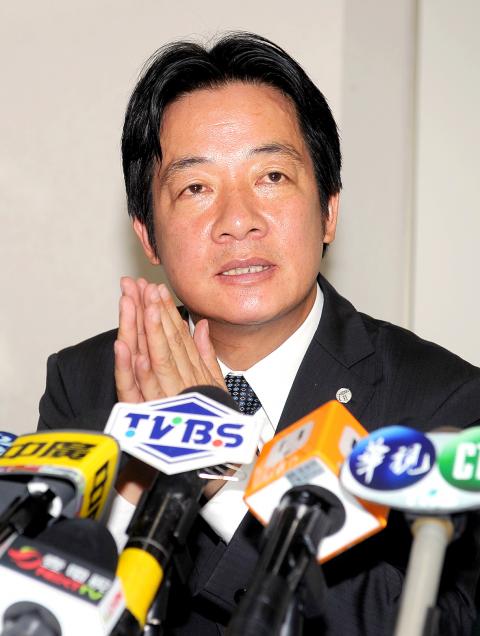|
Tainan mayor criticizes minister’s
comment
By Shih Hsiu-chuan / Staff reporter

Greater Tainan Mayor William Lai
talks to reporters yesterday after appearing at the Executive Yuan in Taipei,
where he tried to clarify to Premier Jiang Yi-huah the difference between the
Dapu demolitions case and work on an underground railway in Greater Tainan.
Photo: CNA
Greater Tainan Mayor William Lai (賴清德)
yesterday criticized Minister of the Interior Lee Hong-yuan (李鴻源) for
politicizing the ongoing protests over the controversial land grab case in
Miaoli County’s Dapu Borough (大埔).
Lai demanded clarification from Lee on his recent comment that the planned
project in Tainan to move an 8km-long railroad track underground was similar to
the situation in Dapu, in which the Miaoli County Government forcibly demolished
four houses, despite strong opposition.
“The two cases are different. As the head of the Ministry of the Interior,
Minister Lee should have understood the differences, but I would rather believe
that he just made a genuine mistake,” Lai said.
Lai said the way Lee drew a parallel between the Tainan case and the case in
Dapu was aimed at deflecting the focus from the land expropriation in Dapu,
which has led to mounting pressure regarding the project in Tainan, which is
also facing opposition.
Earlier this week, Lee insinuated that the Dapu case sparked opposition from the
anti-land grabbing protesters because they favored the Democratic Progressive
Party, of which Lai is a member, rather than the Chinese Nationalist Party (KMT).
Lee comment was not true and could mislead people and could delay implementation
of the railroad project, Lai said yesterday.
According to Lai, the plan to move railroad tracks in the city underground was
finalized by the Executive Yuan in September 2009, a year before he was elected
mayor, and was a project an overwhelming majority have hoped for over the past
two decades.
One of the major differences between the cases was that the expropriation of 154
acres of land in Dapu would benefit developers because only 20 acres of this was
to be used to expand a science park, the necessity for which was questionable,
while the rest of the area would be used to build residential and commercial
complexes, Lai said.
In the case of Tainan, after the railroad tracks are moved underground, the land
will be used for road construction to benefit the city, leaving no room for
developers to make profits, he added.
Separately yesterday, Lee, in response to media inquiries, said: “The Dapu and
Tainan cases are differ slightly. One is regular expropriation, one is zone
expropriation.”
“What I want to stress is that expropriation is necessary for major construction
projects that cannot be scrapped. That was my point, I did not comment on either
the situation in Tainan or Dapu, so I think [Lai] might have misunderstood me,”
Lee said.
He said that whether the Land Expropriation Act (土地徵收條例) should be amended is
something that can be discussed, but it may not be in the nation’s best interest
if revision of the law were to lead to the suspension of major development
projects.
Additional reporting by Loa Iok-sin
|
![]()
![]()
![]()